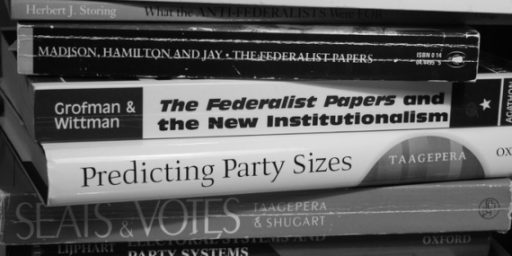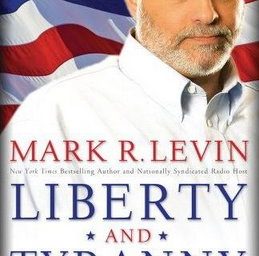PARTIES
No, not that kind. Political ones. Steven Taylor has a long post responding to Brett Marston’s post that I have also commented on. Steven argues that the Founding Fathers’ aversion to political parties was simply foolish, given that “factions” are a natural outgrowth of representative democracy.
This is certainly true. I think, however, that what James Madison–and many modern critics of “partisanship”–found distateful about parties isn’t differences of viewpoint so much as rigidity.
Madison realized factions would exist; he just thought permanent ones a bad idea. See Federalist 10, the most famous essay on factions, for example.
Madison understood that factions were inherent in self government:
By a faction, I understand a number of citizens, whether amounting to a majority or a minority of the whole, who are united and actuated by some common impulse of passion, or of interest, adversed to the rights of other citizens, or to the permanent and aggregate interests of the community.
There are two methods of curing the mischiefs of faction: the one, by removing its causes; the other, by controlling its effects.There are again two methods of removing the causes of faction: the one, by destroying the liberty which is essential to its existence; the other, by giving to every citizen the same opinions, the same passions, and the same interests.
It could never be more truly said than of the first remedy, that it was worse than the disease. Liberty is to faction what air is to fire, an aliment without which it instantly expires. But it could not be less folly to abolish liberty, which is essential to political life, because it nourishes faction, than it would be to wish the annihilation of air, which is essential to animal life, because it imparts to fire its destructive agency.
The second expedient is as impracticable as the first would be unwise. As long as the reason of man continues fallible, and he is at liberty to exercise it, different opinions will be formed. As long as the connection subsists between his reason and his self-love, his opinions and his passions will have a reciprocal influence on each other; and the former will be objects to which the latter will attach themselves. The diversity in the faculties of men, from which the rights of property originate, is not less an insuperable obstacle to a uniformity of interests. The protection of these faculties is the first object of government. From the protection of different and unequal faculties of acquiring property, the possession of different degrees and kinds of property immediately results; and from the influence of these on the sentiments and views of the respective proprietors, ensues a division of the society into different interests and parties.
The latent causes of faction are thus sown in the nature of man; and we see them everywhere brought into different degrees of activity, according to the different circumstances of civil society. A zeal for different opinions concerning religion, concerning government, and many other points, as well of speculation as of practice; an attachment to different leaders ambitiously contending for pre-eminence and power; or to persons of other descriptions whose fortunes have been interesting to the human passions, have, in turn, divided mankind into parties, inflamed them with mutual animosity, and rendered them much more disposed to vex and oppress each other than to co-operate for their common good. So strong is this propensity of mankind to fall into mutual animosities, that where no substantial occasion presents itself, the most frivolous and fanciful distinctions have been sufficient to kindle their unfriendly passions and excite their most violent conflicts.
So, while there were ways to rid ourselves of factions, they are actually worse than factions themselves. So, what to do?
The traditional answer had been liberty and equality but Madison understood this wasn’t a solution:
From this view of the subject it may be concluded that a pure democracy, by which I mean a society consisting of a small number of citizens, who assemble and administer the government in person, can admit of no cure for the mischiefs of faction. A common passion or interest will, in almost every case, be felt by a majority of the whole; a communication and concert result from the form of government itself; and there is nothing to check the inducements to sacrifice the weaker party or an obnoxious individual.
Well, what then?
A republic, by which I mean a government in which the scheme of representation takes place, opens a different prospect, and promises the cure for which we are seeking.
***
Madison then goes on to explain that a representative government, especially a federally based model such as devised in the Constitution, would pit faction against faction so that none held sway for very long. Rural and urban, small state vs. large state, etc. would all have different interests and, more importantly, be forced to cooperate with other factions to form a majority on any given issue.
Political scientists, especially those who study comparative politics (of which Steven is a specialist), use a slightly different terminology to express this issue. They talk about “cleavages”–divisions within society–being either “cross-cutting” or “reinforcing.” The first type are what Madison wanted to encourage: shifting coalitions between groups who agreed on some issues and disagreed on others. The latter type are common in some Third World countries and largely explain why they are failed states: differences in race, ethnicity, language, religion, economic status, etc. all line up to create permanent, bitter, divisions in the polity.
There was a time when reinforcing cleavages predominated in the United States; these led to a bitter civil war. Thankfully, although it sometimes seems otherwise, cross-cutting cleavages have been the norm for the past 100-odd years. Our two political parties are indeed divided ideologically along fairly natural lines, but the hard-core ideological adherents to the parties comprise roughly 40 percent of the population. While there are some bitter issues that seem permanent–abortion being the most obvious–few of us agree with the party with which we align ourselves all of the time.





The ugly part is the disagreeableness and nastiness inherent is some members of each faction. They have neither the wit nor wisdom to temper their speech to acceptable levels commensurate with the seriousness of the difference. Lack of even the barest of civility marks them but does not stop them.
A pox on ALL their houses!
Gotta love old James Madison. Federalist 10 is still the best explanation for pluralist democracy out there, and it’s only 216 years old. 🙂
Now, if only I could get my ?@#! students to read it…